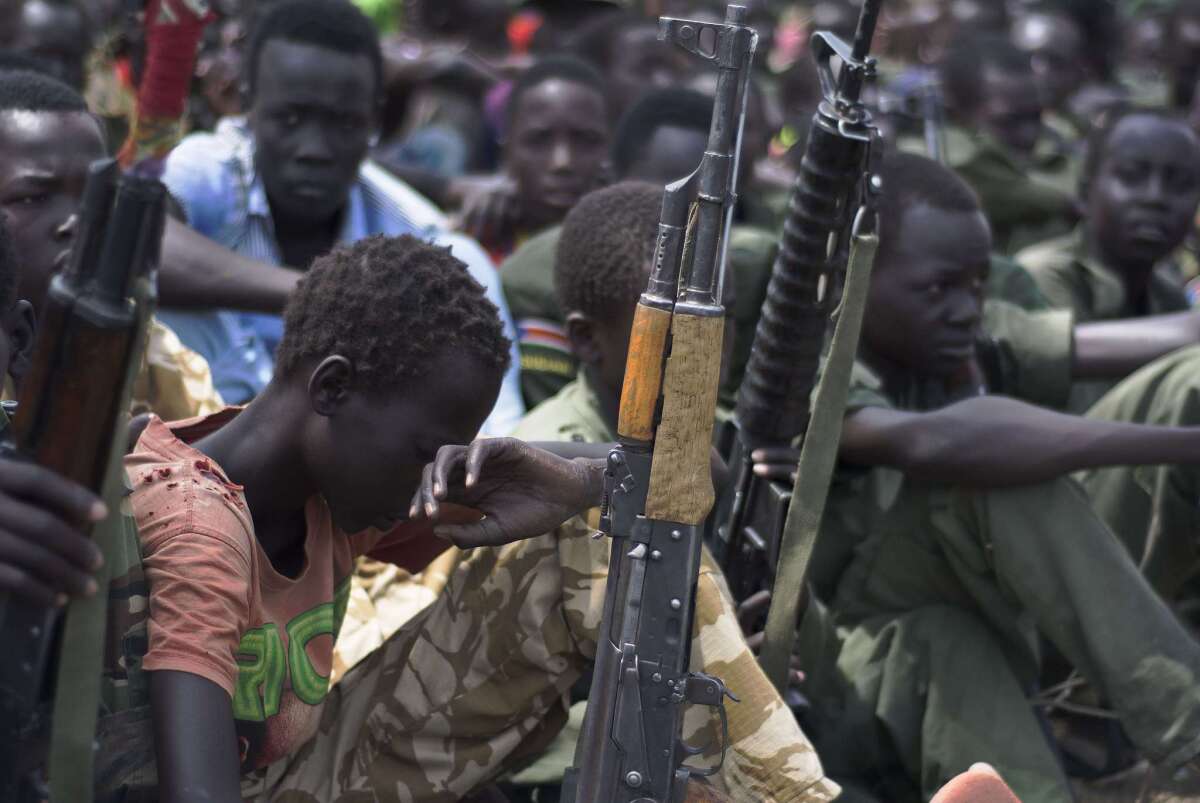Dozens of boys abducted from South Sudan displacement camp, UNICEF says

- Share via
Reporting from Johannesburg, South Africa — Dozens of South Sudanese boys, some as young as 13, were recently abducted by an armed group in South Sudan as they prepared for school exams, UNICEF reported Saturday.
UNICEF did not say what group had seized the boys from a displacement camp, but the abductions reportedly took place in an area controlled by government forces and allied militias. Several days ago, the rights group Human Rights Watch accused government forces of recruiting child soldiers in the same area.
War broke out in South Sudan in December 2013 after the governing Sudan People’s Liberation Movement and the army split, triggering ethnic killings and fighting in many parts of the country. The two sides recently signed a peace agreement designed to establish a power-sharing government.
The agreement set a March 5 deadline to reach a comprehensive peace deal. The government recently postponed elections that were due in June for two years.
South Sudan won independence from Sudan in 2011, after a civil war from 1983 to 2005. But tension between leaders of the Sudan People’s Liberation Movement deepened in 2013, leading to the outbreak of warfare.
With heavy fighting continuing, and the conflict between SPLM members largely unresolved, there is doubt that a peace deal and unity government can succeed.
UNICEF, citing witnesses, said armed soldiers surrounded the community of Wau Shilluk near Malakal town in Upper Nile state a week ago and conducted house-to-house searches. At least 89 boys older than 12 were taken. Six schoolteachers were also abducted.
“The recruitment and use of children by armed forces destroys families and communities. Children are exposed to incomprehensible levels of violence, they lose their families and their chance to go to school,” Jonathan Veitch, UNICEF representative in South Sudan, said in a statement.
He said the recruitment and use of children in armed forces and groups was a grave violation of international law.
The abductions took place in an area under government control, close to the site of recent heavy fighting, in violation of a cease-fire deal agreed to this month. Several cease-fires have been signed since fighting broke out, but none has held.
Human Rights Watch reported Monday that South Sudan government forces had been recruiting children to fight in the Malakal area.
“Despite renewed promises by both government and opposition forces that they will stop using child soldiers, both sides continue to recruit and use children in combat,” Human Rights Watch’s director for Africa, Daniel Bekele, said in a statement. “In Malakal, government forces are even taking children from right outside the United Nations compound.”
It said both government forces and rebel militias had a history of forcing children to fight. Both the government and the rebels deny using child soldiers.
Human Rights Watch said that in recent weeks it has documented 25 cases of children being abducted in interviews with parents, relatives and children who narrowly escaped.
The rights group said Johnson Olony, a militia leader allied with the government, had recruited at least 15 children, some forcibly.
Human Rights Watch said it had also gathered many accounts of rebel forces recruiting boys as soldiers or as porters forced to carry water, ammunition and other supplies for fighters.
“One 16-year-old in Bentiu [in the northern area of South Sudan] described his terror when, only a day after being recruited with dozens of others in December 2013, he was given a gun for the first time by a rebel commander and forced to fight,” the Human Rights Watch report said.
More to Read
Sign up for Essential California
The most important California stories and recommendations in your inbox every morning.
You may occasionally receive promotional content from the Los Angeles Times.













